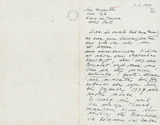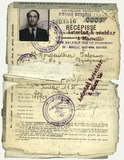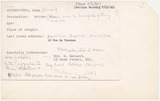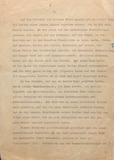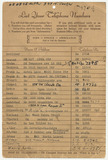Soma Morgenstern: Der Sohn des verlorenen Sohnes (1935) [The Son of the Lost Son, 1946]
Soma Morgenstern: Der Sohn des verlorenen Sohnes (1935) [The Son of the Lost Son, 1946]
Aber ich möchte nicht weiter ein Jud’ sein, so einer, der sich aus dem Apostroph, den man ihm als Schimpf beigegeben hat, bestenfalls eine ironische Krücke macht, mit der er durchs Leben humpelt. Ich will ein Jude sein, ein Jude mit einem „e“.
[But I don’t want to be a Jud’ [a derogatory short form of the German word for Jew, akin to the English “Yid”] anymore, who at best takes the apostrophe assigned to him as an insult and makes an ironic crutch out of it, which he uses to hobble through life. I want to be a Jew, a “Jude” with an “e”. (ed. trans.)]
Soma Morgenstern, Der Sohn des verlorenen Sohnes, 1935
That “e” points to a search for Jewish self-determination which writer Soma Morgenstern began with his debut The Son of the Lost Son. The novel is the first part of the trilogy Sparks in the Abyss.
Inspired by his 1929 visit to a congress of the global organisation Agudas Jisroel in Vienna, Morgenstern engaged intensively with the situation of Eastern European Jews, along with his journalistic work. Against a historical backdrop of increasing anti-Semitism and nationalism, the novel deals with life in rural Eastern Galicia, a stark contrast to life in the city. The novel revolves around the family history of young assimilated Viennese Jew Alfred Mohylewsky, at the same time detailing a search for identity and ancestry between emancipation and assimilation. Stefan Zweig was among those who praised the books as a positive example of the modern novel.
But in August 1933, before Morgenstern had had a chance at greater renown in German-speaking territories, he lost his position at the Frankfurter Zeitung, and eventually his homeland. In 1934 the Austrian election results and violence on the streets forced him to flee Austria for the first time. He stayed in Paris for a few months where he met Joseph Roth and completed his novel. In 1935 he managed to get it published through the Berlin-based Erich Reiss Verlag, which was only allowed to produce books for Jewish readers. The book was the last published by Reiss before he fled to the USA. For many years it was also the last book of Morgenstern’s which appeared in Germany, or in German.


